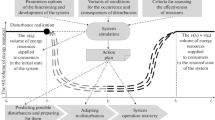Abstract
Engineering of distributed computing systems requires understanding of principles of complex systems, which have not been yet identified. To address the situation we use a concept of structural complexity and present results of computational experiments suggesting the possibility of a general optimality condition of complex systems. The optimality condition introduces the structural complexity of a system as a key to its optimization.
Similar content being viewed by others
References
Allouche JP, Cosnard M (1985) Sequences generated by automata and dynamical systems. In: Dynamical systems and cellular automata, p 17. Academic, London
Ellinas D, Floratos EG, Prime decomposition and correlation measure of finite quantum systems. arXiv:quant-ph/9806007
Feigenbaum M (1980) Universal behaviour in nonlinear systems. Los Alamos Science 1:4
Fromm J, Ten questions about emergence. arXiv:nlin.AO/0509049, and references therein
Grobe R, Rzazewski K, Eberly JH (1994) Measure of electron–electron correlation in atomic physics. J Phys B 27:L503–L508
Gottlieb AD, Mauser NJ, New measure of electron correlation. arXiv:quant-ph/0503098
Korotkikh A (1999) Mathematical structure for emergent computation. Kluwer, Dordrecht
Korotkikh V (2003) The search for the Universal concept of complexity and a general optimality condition of cooperative agents. In: Butenko S, Murphey R, Pardalos PM (eds). Cooperative control: models, applications and algorithms. Kluwer, Dordrecht, pp 129–163
Korotkikh V (2004) An approach to the mathematical theory of perception-based information. In: Nikravesh M, Zadeh L, Korotkikh V (eds). Fuzzy partial differential equations and relational equations. Springer, Berlin, pp 80–115
Korotkikh V (2005) Integers: irreducible guides in the search for a unified theory. Braz J Phys, Special issue on Decoherence Inform Complex Entropy 35(2B):509–515
Korotkikh V, Korotkikh G (2004) On a new quantization in complex systems. In: Pardalos P, Sackellares C, Carney P, Iasemidis L (eds). Quantitative neuroscience: models, algorithms, diagnostics and therapeutic applications. Kluwer, Dordrecht, pp 71–91
Korotkikh V, Korotkikh G, On an irreducible theory of complex systems. arXiv:nlin.AO/0606023
Korotkikh V, Korotkikh G, Bond D, On optimality condition of complex systems: computational evidence. arXiv:cs.CC/0504092
Liu WC, Eberly JH, Haan SL, Grobe R (1999) Correlation effects in two-electron model atoms in intense laser fields. Phys Rev Lett 83 3:520–523
Reinelt G (2000) “TSPLIB”, version 1.2 (accessed 28/11/2000)
Sirovich L, Deane AE (1991) A computational study of Rayleigh-Benard convection. J Fluid Mech 222:251
Vautard R, Ghil M (1989) Singular spectrum analysis in nonlinear dynamics, with applications to paleoclimatic time series. In: Physica D: Nonlinear phenomena. Physica 35D, p 395. Elsevier Amsterdam
Zoldi SM, Greenside HS (1997) Karhunen-Loeve decomposition of extensive chaos. Phys Rev Lett 78:1687
Author information
Authors and Affiliations
Corresponding author
Rights and permissions
About this article
Cite this article
Korotkikh, V., Korotkikh, G. On principles in engineering of distributed computing systems. Soft Comput 12, 201–206 (2008). https://doi.org/10.1007/s00500-007-0191-x
Published:
Issue Date:
DOI: https://doi.org/10.1007/s00500-007-0191-x




